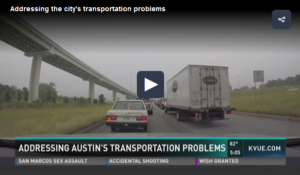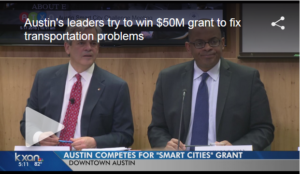Here’s the latest rundown of coverage on Austin’s bid for the U.S. Department of Transportation’s Smart City Challenge.
“Transportation Transformation: How the DOT is driving ‘smart’ change”
By Jerry Weiland and Bianca Wachtel
http://blog.rmi.org/blog_2016_05_13_transportation_transformation_how_dot_is_driving_smart_change
Last March, during the South by Southwest festival, U.S. Transportation Secretary Anthony Foxx announced the seven city finalists for a single $40 million grant as part of the Smart City Challenge, aimed at transforming mobility in the winning city. Rocky Mountain Institute (RMI) has been working with two of the finalists—Austin, Texas, and Denver, Colorado—on enhancing their mobility systems through market-based approaches. Now RMI is collaborating with them on their final grant proposals.
“Austin’s collaboration with RMI isn’t just helping us develop innovative mobility solutions,” says Austin Mayor Steve Adler. “RMI is helping us innovate the way our city imagines the possibilities in the first place, which is absolutely critical as we move from an unworkable status quo toward a future that no American city has yet reached.”
“Texas could solve transportation problems for the US”
By Jen Duthie and Chandra Bhat
http://www.star-telegram.com/opinion/opn-columns-blogs/other-voices/article77058272.html
Texas is uniquely poised to be an incubator for national transportation solutions. We have an active network of entrepreneurs, technology industries and major universities with top-tier transportation research centers, and we are facing some of the country’s most challenging traffic congestion problems and mobility equity issues. But a substantial shift in transportation options is upon us, thanks to technology.
At the Center for Transportation Research at The University of Texas at Austin, we are working on a two-way open data sharing portal that will improve how transportation providers, including businesses and government entities, offer effective mobility services.
“City Leaders make final pitch for $50 million transportation grant”
By Amanda Dugan
http://kxan.com/2016/05/17/city-leaders-make-final-pitch-for-50-million-transportation-grant/
There’s nothing like a deadline where $50 million dollars is at stake. Austin is looking at just that.
Tuesday, Mayor Steve Adler, members of city council and other local leaders hosted a conversation with U.S. Transportation Secretary Anthony Foxx to make a final pitch on why Austin should receive a grant for transportation issues. Some explained why Austin’s transportation needs would best utilize the grant and what steps are being taken to keep the city cutting edge in the world of transportation.
“Transportation Secretary: Austin still in running for Smart City Challenge”
By Amber Downing
http://www.kvue.com/news/traffic/austin-still-in-running-for-smart-city-challenge-despite-prop-1-vote/199690490

On Tuesday, United States Secretary of Transportation Anthony Foxx weighed in on Austin’s plan so far and the city’s recent vote that led to Uber and Lyft leaving town.
Many in Austin wonder whether our chances of winning the $40 million Smart City Challenge are in jeopardy after voters turned down Proposition 1 and Uber and Lyft left town.
“I wouldn’t be here if Austin wasn’t a strong contender in the challenge,” said Foxx. “That remains true and it will stay true, depending on the application that comes and I’m looking forward to see what Austin wants to do when it grows up.”
“Interiano: Austin provides a welcome home for tech”
By Gerardo Interiano, Head of External Affairs at Google.
http://www.mystatesman.com/news/news/opinion/interiano-austin-provides-a-welcome-home-for-tech/nrMZw/
We have found Austin welcoming for some of our most exciting innovations. Austin was the second city — and the first outside of California — where we began testing self-driving cars. Austin has both embraced this technology and given us some great feedback, too. We believe this technology has the potential to make our roads safer and less congested, while increasing mobility and lowering transportation costs for our citizens.
Google is committed to Austin, as evidenced by the roots we’ve put down with the Google Fiber Space on West Second Street and the new office space under construction near the new central library. The Austin model has worked for Google, and we are glad to be a part of Austin’s future.

